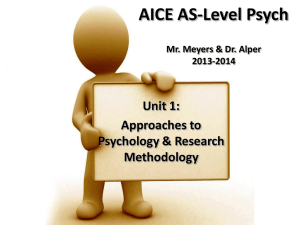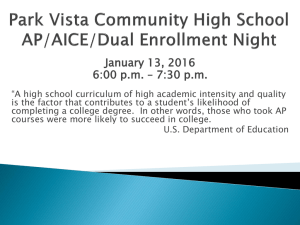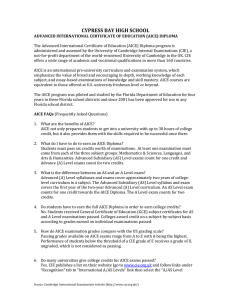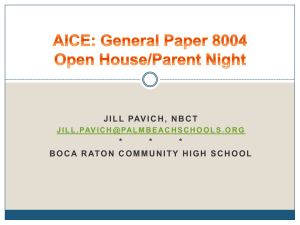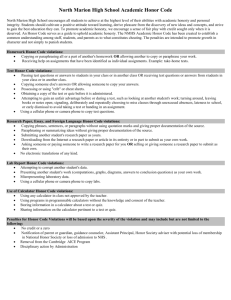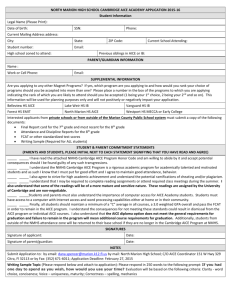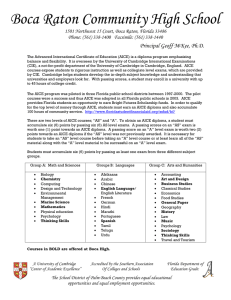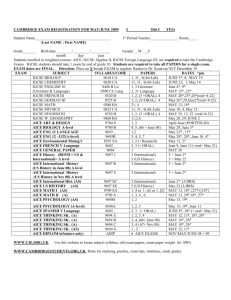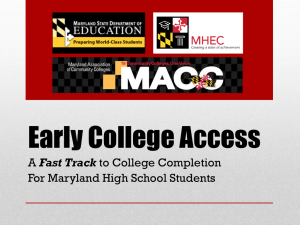Dual Enrollment - the School District of Palm Beach County
advertisement
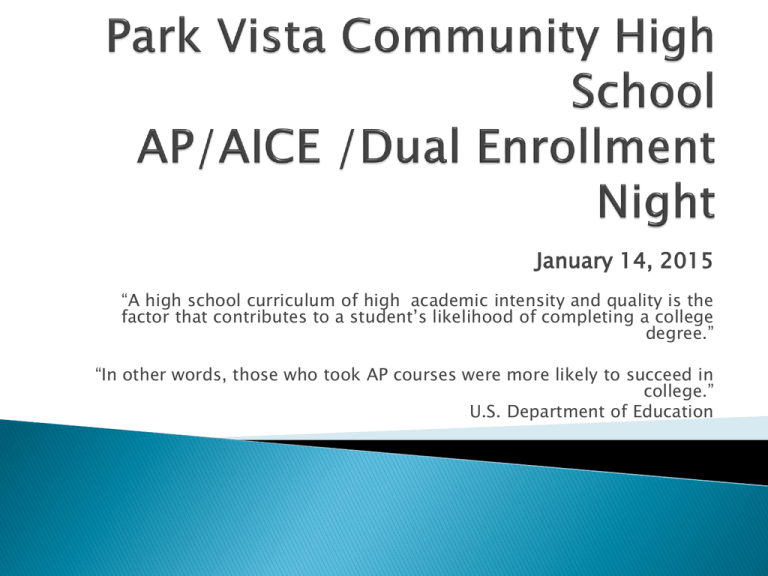
January 14, 2015 “A high school curriculum of high academic intensity and quality is the factor that contributes to a student’s likelihood of completing a college degree.” “In other words, those who took AP courses were more likely to succeed in college.” U.S. Department of Education What will we cover tonight? • What Advanced Placement® Courses and AICE Courses are available ? • AP® and AICE Exams • What Is It Like to Take AP and AICE? • Registration Process for AP and AICE Classes • Dual Enrollment • Classroom Visits 6:00-6:30 General Session – Auditorium 6:30-7:45 Break-Out Sessions to AP Teacher Classrooms & Dual Enrollment Presentation Parents and students choose 3 different sessions you wish to attend and find the classroom listed below and proceed to one of the classrooms. An announcement will be made when you should proceed to the next session. AP Classes Offered: Teacher and Room Number: Biology (10,11,12) Calculus AB (11,12) Calculus BC (12) Chemistry (11.12) Physics 1 (11,12) AICE Environmental (10,11,12) English Language (11) English Literature (12) European History (12) French Language (11,12) Human Geography Studio Art 2D (11,12) Psychology (11,12) Physics (11,12) Spanish Language (10,11,12) Statistics (10,11,12) Studio Art 3D (Jewelry) (11,12) US Government & Politics/Micro Econ (12) US History (11,12) World History (10,11,12) Comparative Politics (10,11,12) AICE Marine Science (AP Credit) (10,11,12) Dual Enrollment Mrs. Pokabla Mr. Marr Mr. Marr Dr. Kalish Mr. Hart Mrs. Dublin Mrs. Millholland Mr. Lott Mrs. Matyskiel Mrs. Vilvandre-Ramirez Mrs. Angione Mr. George Ms. Gilbert Mr. Hart Mrs. Joslin Ms. Weinstein Mr. George Mrs. Popp Mr. Strackman Mrs. Douglass Mr. Dulin Ms. Richards Mr. Dewalt 7-110 6-106 6-106 7-209 7-205 7-112 5-214 5-213 6-205 50-202 6-208 4-112 6-216 7-205 50-214 50-114 4-112 6-212 6-215 P8 6-213 7-115 6-105 Advanced Placement Program (AP) courses are college-level courses offered in high school. AP courses reflect what is taught in top introductory college courses. At the end of the course, students take AP Examsstandardized exams that measure collegelevel work. An international, pre-university program developed by the University of Cambridge in England Examinations have been offered for over 50 years in more than 150 countries and 9000 schools (including 40 HS in Florida) AICE first offered in the US in 1995, and officially adopted in Florida in 2001 PVCHS became an official Centre in August of 2010 as an avenue for Park Vista students to expand learning opportunities to increase learning for our global society Curriculum designed as preparation for college and university programs Similar to AP in that there is a test at the end of the course which determines whether college credit is awarded for the course. AP Exams are administered by schools worldwide on set dates each May. Exams usually last around 3 hours. Each AP Exam contains: Multiple-choice questions Free-response questions (essay, problemsolving and oral response) Students who do well on AP Exams (3, 4 or 5) can earn college credit and/or placement into advanced courses in college. 65% of colleges give credit for earning a 3 on an exam 33% of colleges require a 4 to earn college credit 2% of colleges require a 5 to earn credit Students who pass AICE exams can be awarded college credit Passing grades on AICE exams range form A to E with A being the highest. Performance of students below the threshold of a grade of E receives a grade of U, ungraded, which is considered not passing. (A department of Education AICE program study found that a grade of E most closely correlated with and Advanced Placement exam grade of 3. Each college has a chart on their website which indicates what passing score is required to have credit awarded AP courses expose students to college-level work, can be challenging, but it’s work that pays off. AP courses are often the most interesting and fulfilling courses a student takes in high school. Students develop confidence, and learn the study habits and time management skills essential for success in college. AP courses typically demand more of students than regular or honors courses. Classes tend to be fast-paced and cover more material than typical high school courses. More time, inside and outside of the classroom, is required to complete lessons, assignments and homework. AP teachers expect their students to think critically, analyze and synthesize facts and data, weigh competing perspectives, and write clearly and persuasively. Colleges rank “grades in college prep courses” and “strength of curriculum” as the top two factors in the admission decision 85% of selective colleges and universities report that a student’s AP experience favorably impacts admission decisions. A recent study showed that students who earned a 3,4 or 5 on the AP Exam had higher first year college grade point averages and were more likely to return for the second year than non-AP students of similar ability. “One of the best standard predictors of success at Harvard is performance on AP Exams.” William Fitzsimmons, Dean of Admissions, Harvard University A study done by the Director of Admissions at the University of Florida found that AICE program graduates attending the University of Florida had an average end-of-year freshmen year GPA of 3.46 whereas students coming from other acceleration mechanisms such as Advanced Placement (AP) and International Baccalaureate (IB) had an average of 3.12 and 3.10 respectively. Students who take AP courses and exams are much more likely than their peers to complete a college degree on time. Only one in four students who enter college complete a bachelor’s degree in four years. A recent study showed that students taking AP courses and exams were much more likely to earn a college degree in four years. For example, AP English Literature students had four-year college graduation rates that were 62% higher than students that had not taken AP English Literature. Students who take five years or more to graduate can spend $8,893-$30,094 for each additional year in college. ◦ The average college cost per year for a Florida fouryear public institution is $8,893 and $22,203 for out-of state students. ◦ Students attending private institutions might expect to incur $30,094 for each additional year it takes to earn a bachelor’s degree. (Tuition and fees only!) Biology Calculus AB Calculus BC Chemistry Comparative Politics English Language English Literature AICE Environmental Science European History French Language Human Geography AICE Marine Science Microeconomic Physics 1 Psychology Spanish Language Statistics Studio Art 2D/Drawing Govt. & Politics US History World History Complete a separate application for each AP/AICE course a student would like to take. Attach a copy of your transcript (follow directions on blue sheet for Parchment.com) with the courses highlighted in the subject area of the AP class which you are applying for Turn in applications to Guidance by January 23. February 6th-List of students accepted into classes will be posted outside Guidance ◦ If accepted into AP course, pick up AP Course Selection Sheet in Guidance. ◦ Get signature of AP teacher and parent ◦ Attach AP Course Selection Sheet to regular Park Vista Course Selection Sheet, which will be given out Feb. 2 & 3 at registration assemblies. ◦ Return to English teacher (9th & 10th), or US History (11th) by Feb. 27. Free College Classes Earn high school AND college credit concurrently Get a head start on your college education Students who: Completed 9th grade Have a minimum of 3.0 GPA Have “College Ready” test scores in English, Math & Reading. SAT: Verbal = 440 / Math = 440 or ACT: Eng = 17 / Reading = 19 / Math = 19 or PERT: Reading = 106 / Math = 114 / Writing = 103 Attend a mandatory Advising Session at Palm Beach State College Students can take classes at Palm Beach State or at Florida Atlantic University Students can take 2 classes per semester plus a lab class ( 8 hours maximum) Students take the classes at college campus and must provide own transportation Students must earn a “C” or better to remain in Dual Enrollment Grade becomes part of permanent high school and college transcript If interested in Dual Enrollment (summer or fall): Tonight-Go to Room 6-105 for information Also Student -must sign up in guidance to attend march 3rd Dual Enrollment Assembly Parents-attend our Coffee Talk on March 12th 8am in the Media Center or Visit PVCHS.com, Guidance tab to view our power point presentation on Dual Enrollment or visit www.palmbeachstate.edu/Dual enroll.xml or www.fau.edu/registrar/dual-enrollment/ For 9th Graders Receive full-tuition Florida Prepaid College Scholarship Receive a mentor Receive a College Readiness Coach Must be on Free/Reduced Lunch Program Pick up application tonight or See Mr. Tarini in guidance tomorrow Mr. Hart-AP Physics teacher will not be here tonight, please come to stage to pick up the syllabus for AP Physics for your review and you may go to room 7-205 before school to see Mr.Hart about the AP Physics class. For more information about AP, AICE or Dual Enrollment, please visit: www.collegeboard.org/apstudents www.cie.org.uk www.palmbeachstate.edu/dualenroll/ www.fau.edu/registrar/dualenrollment/ Please proceed to the classroom of the AP/AICE course that you are interested in learning about or room 6-105 for Dual Enrollment information.
